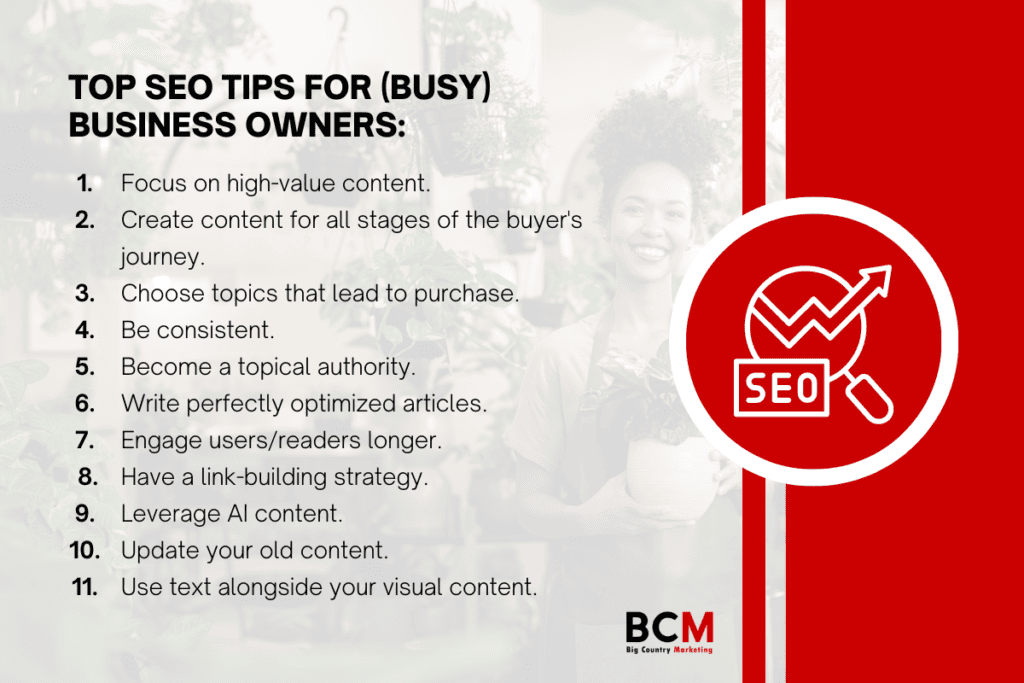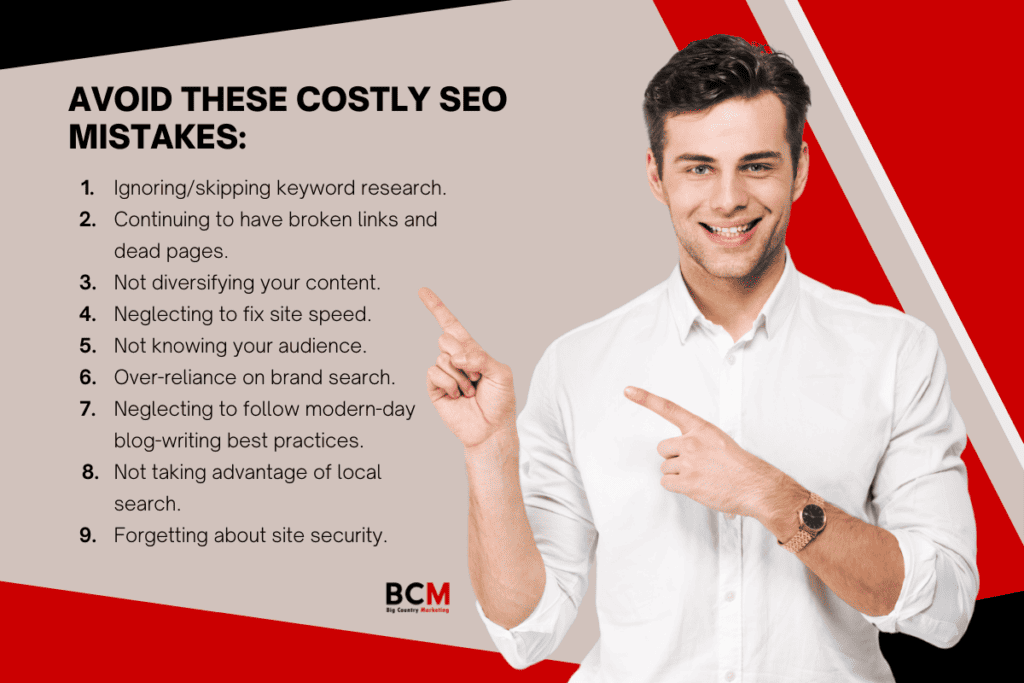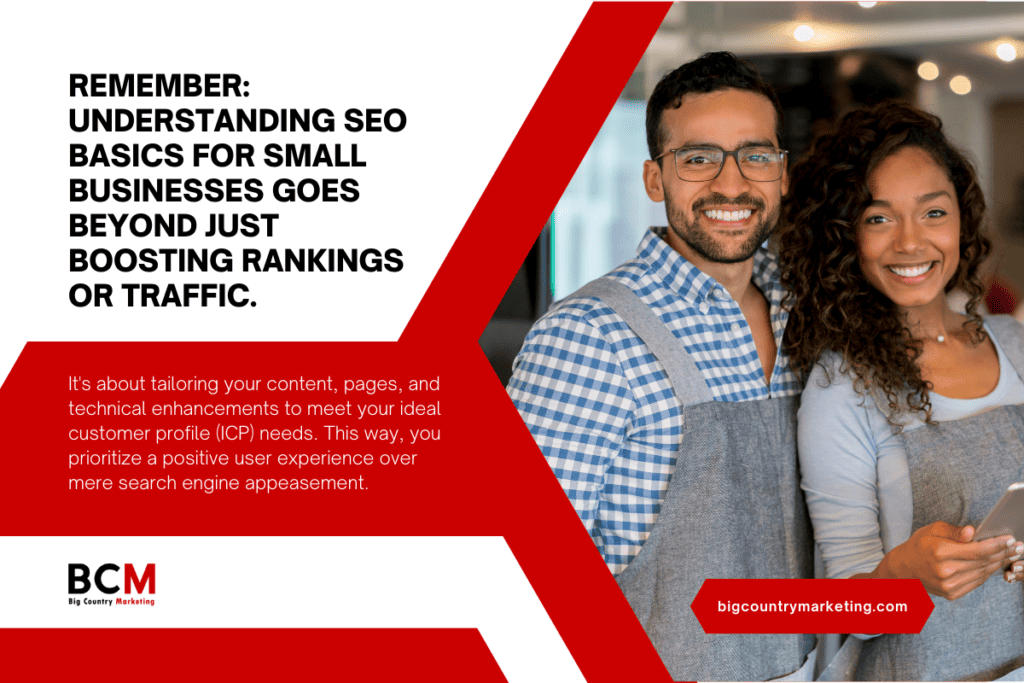SEO Basics for Small Business: Top Tips You Should Know
Ever feel like SEO is a secret society with a language all its own? Well, we’re breaking down the barriers with our guide on ‘SEO Basics for Small Businesses.’ No decoder ring needed!
We’re spilling the beans on everything from user-centric strategies to common pitfalls. And we promise, no tech jargon that sounds like it’s been spit out by a malfunctioning robot. So, grab a cup of coffee and get ready to become the SEO-savvy entrepreneur you were always meant to be!

Small business owners, take note: SEO is your secret weapon. It’s not just about keywords, but about knowing your customers, delivering top-notch content, and playing the long game. It’s the tortoise’s strategy in the race for organic traffic.
Are you a small business owner feeling overwhelmed by the ever-evolving world of SEO?
With constant algorithm updates, new search engine optimization strategies, and a plethora of tools to choose from, it’s like trying to hit a moving target while juggling flaming torches. And let’s not forget: you’re already wearing multiple hats running your business.
According to BrightEdge, 68% of online experiences start with a search engine. That’s a massive pool of potential customers. But here’s the catch: a staggering 0.63% of Google searchers click on results from the second page.
What this means is– if your business website isn’t on the first page, it’s virtually invisible. It’s like throwing a party and forgetting to send out the invitations.
And yet, amidst the chaos and confusion, SEO holds a golden ticket. HubSpot reports that SEO leads have a 14.6% close rate, dwarfing traditional outbound methods.
But how can you, a busy business owner, possibly keep up with the latest SEO developments?
This is where our guide on ‘SEO Basics for Business Owners’ comes in.
Understanding SEO basics for small businesses goes beyond just boosting rankings or traffic. It’s about tailoring your content, pages, and technical enhancements to meet your ideal customer profile (ICP) needs. This way, you prioritize a positive user experience over mere search engine appeasement.
In today’s digital landscape, small businesses must recognize that SEO is not just a tool for visibility but a strategic approach to customer engagement.
When you align your SEO efforts with your Ideal Customer Profile, you’re not just optimizing for search engines but for your audience’s needs and expectations. This approach ensures that your content is not only found but also resonates with your audience, leading to higher engagement and conversions.
The SEO tips we’ve compiled are crucial because they focus on this user-centric approach.
They guide you in creating content that’s not only SEO-friendly but also valuable to your customers. They’re like your GPS in the world of SEO, leading you down the right path and ensuring you don’t get lost in the technical jargon.
These nuggets of wisdom help you understand how to structure your pages for easy navigation, how to improve technical aspects for optimal site performance, and how to provide a positive overall user experience.
By following these tips, you’re not just improving your site’s SEO; you’re enhancing your brand’s online presence and building a strong foundation for customer trust and loyalty.
(It’s like throwing a party on your website– you don’t just want people to show up, you want them to have a good time too!)
Understanding SEO: a Primer for Business Owners
If you’re a typical business owner, having a website gives you an online presence– sort of like an office open 24/7 that lets you service your customers while you are asleep or even on weekends and holidays.
Search Engine Optimization, or SEO, is the practice of optimizing that business website of yours to make it more visible in search engine results pages (SERPs).
Having good SEO allows people to more easily find you online. Search engine optimization continues to be an important part of any online marketing strategy.
It involves various strategies and techniques aimed at increasing your site’s visibility when people search for products or services related to your business in Google, Bing, and other search engines.
SEO is crucial for two main reasons. First, it improves your website’s visibility in search engines, which can lead to increased traffic and conversions. Second, it’s a cost-effective way to market your business, as organic search targets users who are actively looking for your products or services online.
The Shift from Search Engine-Centric to User-Centric SEO
In the early days of SEO, the focus was primarily on pleasing search engines. This often involved stuffing keywords into content and building as many backlinks as possible, regardless of their quality.
However, this approach has changed significantly over the years. Today, successful SEO is user-centric. It’s about understanding your audience’s needs and creating high-quality content that answers their questions, solves their problems, and provides value.
Google’s algorithms have become increasingly sophisticated and now prioritize websites that offer a great user experience. This includes factors like site speed, mobile-friendliness, and secure, easy-to-navigate websites.
Important Ranking Factors for Business Owners
There are hundreds of factors that search engines consider when ranking websites. However, some of the most important ones for business owners to be aware of include:
- Quality Content: Content is king in SEO. High-quality, relevant content that matches user intent is likely to rank higher in search engines.
- Backlinks: Backlinks, or links from other websites to your site, signal to search engines that your content is valuable and trustworthy.
- Mobile-Friendliness: With more people using mobile devices to access the internet, search engines favor websites that are optimized for mobile.
- Page Speed: Fast-loading pages provide a better user experience and are favored by search engines.
- Website Security (HTTPS): Security is a top priority for search engines. Websites that are secure (HTTPS as opposed to HTTP) have a clear ranking advantage.
What Makes Websites Rank (or Not Rank)
Ranking in search engines is not an exact science. It’s a combination of various factors, including the ones mentioned above.
However, it’s important to note that just because you’re doing everything right doesn’t guarantee top rankings. SEO is a long-term strategy, and it often takes time to see results.
On the flip side, there are also factors that can prevent your website from ranking well. These include things like duplicate content, poor user experience, and attempts to trick search engines (known as black-hat SEO techniques).
With all that in mind, understanding SEO is crucial for any business owner. It’s not just about getting your website to rank in search engines, but about understanding your audience, providing value, and improving the overall user experience.
And remember, SEO is like a marathon, not a sprint. It might take some time to see results, but the long-term benefits are well worth the effort. So, keep running!
The User-Centric Approach to SEO
In the early days of SEO, Google’s algorithm focused on inbound links and keywords.
But as the digital landscape evolved, so did Google’s approach to ranking web pages. Today, Google’s algorithm prioritizes user experience, penalizing sites that fail to provide value to users.
This shift towards a user-centric approach to SEO is reflected in several of Google’s major updates over the past decade. These updates, which include Panda (2011), Hummingbird (2013), and Core Web Vitals (2021), have all been geared towards improving user experience and rewarding sites that meet users’ needs and expectations.
The user-centric approach to SEO is not just about creating a website that “works well for users.” It’s about aligning your SEO efforts with the needs and intent of your Ideal Customer Profile (ICP).
This means creating content that answers users’ questions, addresses their pain points, and delivers the products or services they seek.
Remember, high search rankings don’t last if the content doesn’t provide value to consumers. As one SEO expert humorously put it, “A website without SEO is like a car with no gas. It can sit there, looking pretty, but it’s not going to go anywhere.”
So, as you embark on your SEO journey, remember to put the user first. After all, SEO is not just about driving traffic to your site. It’s about providing a positive user experience that turns visitors into customers.
Top SEO Tips for Small Businesses

Feel like SEO is a marathon you didn’t sign up for? Here are some top-shelf SEO tips for busy business owners (like yourself) to give you the energy boost you need. Lace up your digital sneakers and let’s get your business on the fast track to online visibility!
Did you know that Google uses over 200 factors in its algorithm for ranking websites? Or that the first result in Google gets approximately 32% of all clicks?
These statistics highlight the complexity and potential of SEO. But don’t worry. We’ve distilled the most important tips for you.
1. Focus on High-Value Content
Avoid creating “commodity content” that’s similar to what everyone else is publishing. Instead, strive to provide unique, high-value content that offers something new to your audience. This could be in-depth guides, expert insights, or original research. Remember, Google loves content that provides value to its users.
Google also loves fresh content (and, therefore, loves blogs in general). And this is because many high-ranking blogs cover a specific topic extensively. What this tells us is that longer & informative content tends to rank higher in Google’s search results.
Gone are the days of 300- to 400-word posts published daily. At a time when all sorts of topics have already been covered, coming up with longer, more informative, more market-relevant article is the new standard. In fact, the average Google first page result contains 1,800 words now.
2. Create Content for All Stages of the Buyer’s Journey
Your content should cater to potential customers at all stages of the buyer’s journey, from awareness to consideration, to decision. This means creating a mix of content, from educational blog posts to product comparisons and customer testimonials.
3. Choose Topics That Lead to Purchase
While it’s important to provide value, you also want to guide users toward making a purchase. Choose topics that naturally lead to your products or services and include clear calls to action.
4. Be Consistent
SEO is not a one-time effort. It’s a long-term strategy that requires consistency. Regularly update your website with fresh content, keep up with SEO trends, and continuously optimize your site.
It’s perfectly fine to publish at a lower frequency (i.e., once a week, or once a month, rather than every day) as long as you do so with higher-quality content.
5. Become a Topical Authority
Google favors websites that are authorities on a particular topic. To establish your business as an authority, create comprehensive and high-quality content around a specific subject area.
To put things into perspective, great content helps establish your experience and expertise in a particular subject matter, building your reputation is all about authority, and an awesome user experience is all about nurturing and earning trust.
6. Write Perfectly Optimized Articles
Learn the basics of on-page SEO to write articles that both humans and search engines will love. This includes using your keywords strategically, optimizing your meta tags, and creating user-friendly URLs.
LSI keywords now form the basis of how keyword research is done today. They are more conversational in structure, more multi-worded phrases, perhaps even in question form.
These words and phrases should naturally flow within your articles as you’re creating a genuinely helpful, informative, and market-relevant post.
Note that there are a good number of online tools available to help you generate your own list of LSI keywords to help you figure out exactly what people are entering into search:
- Ubersuggest
- Keywords Everywhere
- AnswerThePublic
- SEOBook’s Free Keyword Tool
- LSI Graph
- LSI Keywords
- KeySearch LSI Keyword Generator
7. Engage Users Longer
The longer users stay on your site, the better your chances of ranking higher. Encourage readers to dive deeper into your site by linking to related articles, using engaging multimedia, and providing interactive content.
Consider using infographics, charts, screenshots, charts, and other visual aids to help simplify more complex concepts in your article, or make important points easier to remember.
Video is also a great way to explain new concepts or to add more items to further expound on your ideas. Don’t forget that you can also provide downloadable notes, transcripts, slideshows, reports, guides, and references for visitors to take away with them as well.
More importantly, make an effort to properly label and tag all your media, as this helps with your overall online visibility as well.
8. Have a Link-Building Strategy
It’s not always easy, but reaching out to other website owners is great for link building. A good backlink profile helps establish your authoritativeness.
Backlinks are a major ranking factor. Develop a link-building strategy that includes techniques like guest blogging, broken link building, and creating shareable content.
The idea is to peddle your optimized pieces of content around to others within your industry. Perhaps they’d like to feature your awesome articles in their content.
Use tools like BuzzSumo and Ahrefs to find suitable sites to reach out to.
Do some guest blogging, ask if you could participate in podcasts, and see if you could arrange for interviews by your local media groups.
Link-building is understandably slow-going at first and could take quite a bit of time. But as your pieces get picked up by the audience and fellow industry players, you’ll soon find that the rewards in terms of traffic are well worth it.
9. Leverage AI Content
AI can help you create content that’s optimized for SEO. Tools like ChatGPT can generate content ideas, write SEO-friendly articles, and even analyze your SEO performance.
10. Update Your Old Content
If you already have a fairly well-established blog, revisit it and get rid of redundant and outdated pieces of content. Fold what you can into fresh showcase pieces, and keep adding or updating as needed.
SEO is not a set-it-and-forget-it strategy. Update your old content regularly to keep it relevant, improve its quality, and target new keywords.
11. Use Text Alongside Your Visual Content
While visual content like images and videos can enhance user engagement, search engines still rely heavily on text to understand and rank your content. Always include relevant and optimized text alongside your visual content.
Remember, anyone can get started with some SEO basics; search engine optimization is easy to understand, but it does take a lot of work, and continues to evolve with ever-changing consumer behavior and other emerging market trends.
Indeed, SEO is a highly specialized skill and is very much sought after, especially so in this age of e-commerce stores, smartphones, and artificial intelligence.
Common SEO Mistakes to Avoid

Avoiding SEO mistakes is like dodging digital landmines! Here are some more tips to help you steer clear of the costly errors that could blow your SEO strategy to smithereens. Stay on the safe path with our expert advice.
Did you know that a staggering 90.63% of pages get no traffic from Google? This is often due to common SEO mistakes that many small business owners make.
Let’s dive into some of these pitfalls and how you can steer clear of them.
1. Ignoring Keyword Research
Many website owners create content randomly and expect to get search traffic. But if nobody’s searching for those topics, then nobody’s clicking through to your pages.
Keyword research is a fundamental part of SEO; skipping it is like shooting in the dark. You need to understand what your potential customers are searching for and tailor your content to meet those needs.
2. Having Broken Links and Dead Pages
One of the most common SEO errors is having broken links and dead pages on a site. These can lead to a poor user experience and lower your site’s credibility in the eyes of search engines. Regularly check your website for any broken links or pages that no longer exist and fix them promptly.
3. Not Diversifying Your Content
An effective SEO content strategy incorporates more than just blog articles. While these are the backbone of any rankable SEO plan, diversifying your content with videos, infographics, podcasts, and other forms of content can help you reach a wider audience and improve your SEO.
4. Neglecting Site Speed
The average speed of a top-ranking site is just under 2 seconds (1900 ms). Every second slower than this incurs an exponential likelihood of visitors bouncing out to visit another site down the list (because no one wants a slow-loading site).
The faster your site, the more Google will favor it. Especially now, with the page experience ranking factor slowly rolling out. It’s important to work on your site speed to keep your pages in the search results.
When your page loads slowly, it can be anything from:
- Poor web hosting or server response time
- Clunky coding of the site (HTML, CSS, Javascript)
- Unoptimized photos
- Too many plugins
- Too many redirects
5. Not Knowing Your Audience
One of the fundamental principles of SEO is to understand your target audience. That means knowing your audience at the most minute and granular level. SEO isn’t just about getting traffic to your site; it’s about getting the right traffic.
6. Over-reliance on Brand Search
Many companies spend a lot on making their brand known but neglect the importance of organic search. Building content around genuinely helping the customer is what wins in the end.
Remember, SEO is not just about getting to the top of search engine results. It’s about staying there, and that requires consistent effort and avoiding these common mistakes.
7. Neglecting modern-day blog-writing best practices
Personally, I still come across businesses that insist on creating content using tips and tricks from as far as 10 or 15 years ago. So much has happened now, considering how people’s online habits have changed, how search algorithms are far more sophisticated, and how far AI has come.
That said, here are a few mistakes you should be avoiding when creating blog content in 2023:
- Copying content. Don’t copy content from other sites and paste it onto your own. Remember, Google functions to index billions of websites all over the world. It’s sophisticated enough to know that content has been copied from elsewhere.
- Generating content automatically. Plugins that auto-generate content for you by giving you an RSS feed of articles or even pages of content from other sources will be flagged by Google as they index your site.
- Clickbait headlines. Don’t use overly exaggerated or hyped-up headlines. These may create a false set of expectations, and Google doesn’t like giving sites a good ranking when readers tend to bounce due to disappointing content.
- In-your-face and sneaky ads. Don’t crowd up your pages with too much advertising or block your content with large ads so that your audience can’t read your article. Don’t even disguise ads or affiliate links as part of your main content. Avoid the use of popups.
- Being superfluous. Don’t be evasive with your answers by using a lot of unnecessary blocks of text.
8. Not Taking Advantage of Local Search
In case you didn’t realize, nearly half (46%) of all Google searches are local. With more people on their smartphones looking for local businesses, conversion rates for local markets are now better than ever.
If you haven’t optimized your site for local search, you’re missing out on a lot of opportunities. To quickly remedy that:
- Claim your Google My Business page for your brand.
- Make sure you have updated NAP (Name, Address, and Phone number) info on your website. These have to be consistent throughout all your social media, directory listings, etc.
- Optimize your SiL (Service in Location) keywords.
- Build local citations (online mentions of your business) by reaching out to neighborhood associations, chambers of commerce, industry groups, and other relevant blogs and websites.
9. Forgetting About Site Security
Today, because of data and privacy concerns, having an https:// prefix on your URL is now a requirement. It is a must-have, not a nice-to-have.
This means you have a more secure site– guests who need to log in, enter their information, or make a purchase can rest easier knowing that your site makes it hard for online miscreants to skim their information as they go about their business.
It used to be that only bigger e-commerce sites with lots of online transactions would have this level of site security, but it is now a standard for websites such that not having a secure site can adversely affect your rankings.
As site security gives your visitors that extra peace of mind, knowing they can better trust you and your brand, this all adds up to the overall user experience on your site.
The Future of SEO
“SEO is not about tricking Google. It’s about partnering with Google to provide the best search results for Google’s users.” – Phil Frost.
This quote perfectly encapsulates the future of SEO. It’s not just about keywords and backlinks anymore; it’s about creating a holistic user experience that aligns with the needs and intent of your audience.
Embracing the AI Revolution in SEO
Artificial Intelligence (AI) and advanced technologies are playing an increasingly significant role in SEO.
According to a 2023 article in Search Engine Journal, understanding AI and the interconnectivity of all things will help craft sustainable marketing strategies that survive the rise of AI.
SEO professionals will need to understand the human mind because Google and all algorithms are developed by semantics and neural networks working together.
Brand Integrity and Credibility: The New Currency
Brand integrity and credibility will play a crucial role in the future of SEO.
If great content is all about establishing your expertise, and the user experience is all about earning trust, the last important component will be discussing is authority, and your continuing efforts to keep building and developing this.
Thanks to one of Google’s most recent algorithm updates (the Medic update, as it is called), reputation and authority are now a more major consideration as far as ranking a website on search results go.
Real links from authorized sites and media outlets will help validate brands.
A better reputation and higher authority ultimately mean more credibility, and this is all circles back to what Google is ultimately going for– giving users the most trustworthy, most reliable, most satisfying search results.
That said, today’s SEO is all about building authority, not just online, but in the real world as well. So if authority is clearly of key importance now, what can you do to boost the perceived authority on your website moving forward?
- Showcase your author or publishing team. If your site is all about a business or brand, you might also want to showcase your employees, partners, and other team members.
- Bylines – your posts and pages should be attributed to a real person
- Reviews on Google and on social media
- Citations within local business directories or industry websites
- Create resources designed for sharing (e.g. infographics, reports, podcasts, ebooks, guides, checklists, etc.)
- Media appearances, mentions, and guestings in other brands’ videos and podcasts.
- Outreach, earning backlinks, and other legitimate link-building efforts.
- Other real-world engagements: speaking at conferences or seminars, lectures, authoring books or research papers, and more.
Creating links through credible media sources and showcasing companies online with PR efforts will help brands seem more appealing and credible through the lens of both machines and humans.
SEO: A Tool for Positive Change
In a world where we all are craving global change, more unity, more equality, more freedom, and more happiness, we all can collaborate to build marketing initiatives and utilize tech and media to truly inspire people and the planet.
Brands and marketers have a huge responsibility to not only get ranked in Google but also to convey a bigger story that can relate to humanity, inspire new generations, and help companies be seen in more humanized ways.
As you can see, the future of SEO is not just about adapting to changes in algorithms and technology. It’s about understanding your audience, providing value, and using SEO as a tool to create a positive impact. Small businesses should prepare for these future trends and adapt their SEO strategies accordingly.
Wrapping Up: Your Next Steps in Mastering SEO

Keep in mind, mastering these SEO basics for small businesses isn’t just about climbing the Google ladder or flooding your site with visitors. It’s about crafting a user-centric approach that resonates with your customer’s needs and intent. It’s about transforming your online presence into a resource that’s not just seen, but sought-after.
As we’ve journeyed through the intricacies of SEO, it’s clear that it’s a dynamic and evolving field. But don’t be daunted. The key to mastering SEO is understanding that it’s not a one-time task, but a continuous process of learning, adapting, and improving.
Even as you implement the SEO tips we’ve discussed in this article, consider investing in SEO tools that can help you analyze your website’s performance and identify areas for improvement.
Stay updated with the latest SEO trends and changes in search engine algorithms. And most importantly, always keep your audience at the heart of your SEO strategies.
As we step into the future of SEO, remember this: “The best place to hide a dead body is the second page of Google search.” So, strive to be on the first page, but do it in a way that provides value to your audience and enhances their experience.
SEO is not just about getting traffic to your site; it’s about attracting the right kind of traffic – traffic that converts. So, focus on understanding your Ideal Customer Profile (ICP) and align your SEO efforts with their needs and intent.
In the end, SEO is not just a marketing strategy; it’s a commitment to providing value and a great user experience. And that, dear readers, is the ultimate key to SEO success.
So, go forth and conquer the SEO world, one keyword at a time!






